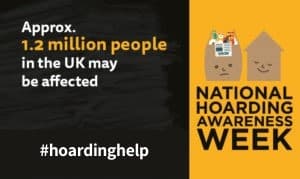How many people suffer from hoarding disorder?

Data relating to hoarding is not something that fire and rescue services are required to record, so we are unable to provide figures relating to incidents where hoarding has been observed. However anecdotal information from our firefighters and team of community safety advisors indicates that hoarding is not an uncommon condition.
Karen Lock, from our Community Safety Team, is our hoarding support facilitator.
Karen said: “We become aware of those suffering with the condition when a tragedy has struck or where safeguarding enquiries indicate a vulnerable person with an emerging issue. Our concern is that there may be many people who are unaware of the risks that hoarding can bring, and therefore welcome the opportunity to help raise awareness, both of the condition, and the ways in which help can be obtained. “
Risks associated with hoarding

There are many risks associated with hoarding, including those related to fire safety, as high levels of clutter make it much easier for a fire to start and create a greater risk of fire spreading, increasing the risk of injury and death. It can also make it very difficult to escape and can lead to difficulties for firefighters tackling the blaze.
By its very nature hoarding is commonly a hidden condition. Frequently connected to social isolation, people may be ashamed to let services in and just too ashamed or embarrassed to talk about it. Often it is a relative or a neighbour who notices that hoarding is problem, but it can be a difficult issue to ask someone about.
Karen added: “Others can become quite critical of people who hoard, but the hoarding is the problem, not the person, and that is why we set up our Hoarding Support Group.
“We are really pleased that we were able to continue to run the sessions throughout the COVID-19 pandemic. The new phone system has also meant we can support people who live further afield who may not previously have been able to get to our meetings.
“Getting people together in this way continues to provide a space for those experiencing hoarding disorder to experience a unique emotional identification with each other and their issues.
“We have found this enhances mutual group togetherness, support and friendship, which can reduce the terrible social isolation that can impact on people with these issues. The experience can really help people to move forward and gain control over their lives.”
How many people suffer from hoarding disorder?

Data relating to hoarding is not something that fire and rescue services are required to record, so we are unable to provide figures relating to incidents where hoarding has been observed. However anecdotal information from our firefighters and team of community safety advisors indicates that hoarding is not an uncommon condition.
Karen Lock, from our Community Safety Team, is our hoarding support facilitator.
Karen said: “We become aware of those suffering with the condition when a tragedy has struck or where safeguarding enquiries indicate a vulnerable person with an emerging issue. Our concern is that there may be many people who are unaware of the risks that hoarding can bring, and therefore welcome the opportunity to help raise awareness, both of the condition, and the ways in which help can be obtained. “
Risks associated with hoarding

There are many risks associated with hoarding, including those related to fire safety, as high levels of clutter make it much easier for a fire to start and create a greater risk of fire spreading, increasing the risk of injury and death. It can also make it very difficult to escape and can lead to difficulties for firefighters tackling the blaze.
By its very nature hoarding is commonly a hidden condition. Frequently connected to social isolation, people may be ashamed to let services in and just too ashamed or embarrassed to talk about it. Often it is a relative or a neighbour who notices that hoarding is problem, but it can be a difficult issue to ask someone about.
Karen added: “Others can become quite critical of people who hoard, but the hoarding is the problem, not the person, and that is why we set up our Hoarding Support Group.
“We are really pleased that we were able to continue to run the sessions throughout the COVID-19 pandemic. The new phone system has also meant we can support people who live further afield who may not previously have been able to get to our meetings.
“Getting people together in this way continues to provide a space for those experiencing hoarding disorder to experience a unique emotional identification with each other and their issues.
“We have found this enhances mutual group togetherness, support and friendship, which can reduce the terrible social isolation that can impact on people with these issues. The experience can really help people to move forward and gain control over their lives.”



